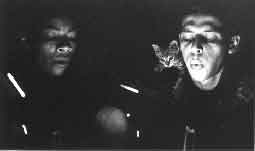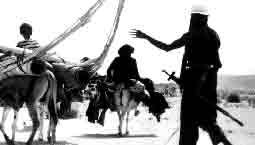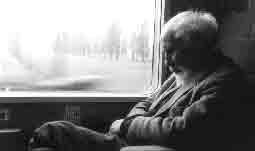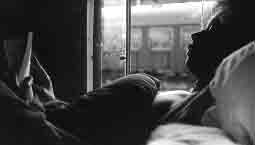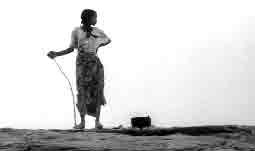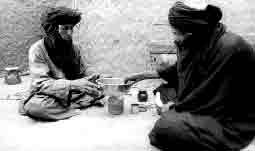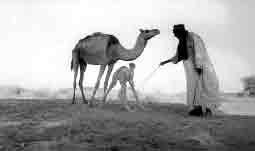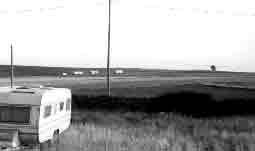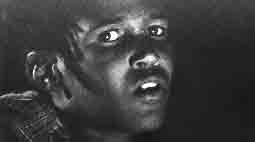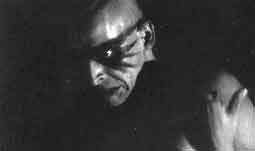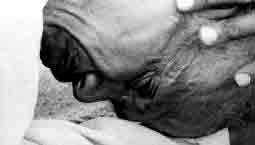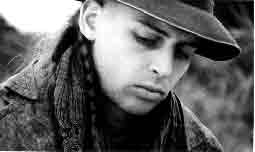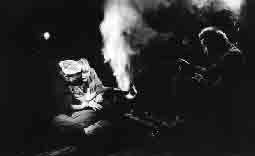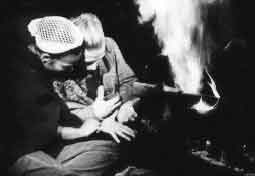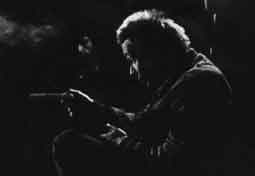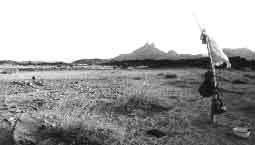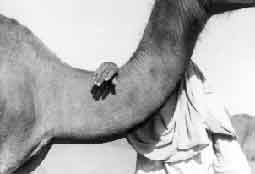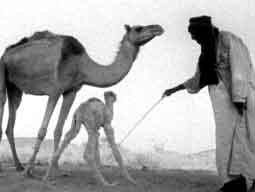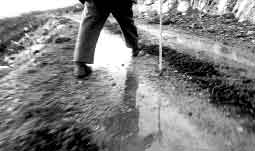Middle of the Moment
a cinepoem
35mm / 1:1.66 / black&white
/ Dolby SR / 80 min.
produced 1990-95
released 1995
Produced by
CineNomad, Germany
Balzli & Fahrer, Switzerland
Written and directed
by
Nicolas Humbert & Werner Penzel
Synopsis
The essence of any
experience, any moment, is to be found where people are in most intense
contact with the place they occupy. And paradoxically, it is through a
nomadic existence that one occupies a space the most intensely. Whether
the nature of this nomadism is largely physical, as for the wandering
tribes that travel the South Sahara and Cirque O - or rather abstract,
as for the American philosopher and poet Robert Lax, is not so important.
What the people portrayed in this documentary share is that their nomadic
disposition, which strips life down to its bare essentials, makes them
into complete centered human beings. They are not stuck in life's cycles
but are co-existing with them, partaking in them with a freedom that is
unknown to most of us.
Film makers Nicolas Humbert and Werner Penzel traveled through Europe
and Africa with these very different nomads for around three years. Resisting
the lure of nostalgia of any kind they have created a film form, a cinepoem
as they call it, in which the freedom of the nomadic life resonates from
each individual shot as well as from the film as a whole. Far from being
a simple comparative study of nomadic lifestyles, middle of the moment
is a nomadic adventure itself. It is lyrical in mood but goes beyond the
merely admirable in its associations. It is not afraid to stay in one
place, but also knows how to travel on to the next. The film makers have
used their equipment and findings as imaginatively as the nomads they
met use theirs, in their daily lives.
Middle of the moment becomes a journey into the most elementary cycles
of life though it never pretends to witness their closure. Its framing
rules out any generalization; what we see is appreciation of personality
and detail. Fred Frith's music for the film wonderfully translates this
sense of the constant movement of things. Far removed though we may be
from an itinerant way of life, which forms a cycle in itself, we are still
sensitive to the images that depict life in terms of its archetypal circles:
sitting around the fire, life in a community, the sharing of food from
one cup, the meeting of old acquaintances, the arena of the circus, the
beginning of a life and the approaching end, which only reveals itself
at a moment where one cannot speak about it anymore.
It would seem that the more sensitive we are, the further we can travel
in middle of the moment.
Distributed by:
Worldwide: Cine Nomad
e-mail: cinenomad@aol.com
website: www.cinenomad.de
USA, Canada: DAME
e-mail: info@actuellecd.com
website: www.actuellecd.com
VHS-NTSC video and CD soundtrack distribution
USA, Canada: Canyon
Cinema
e-mail: films@canyoncinema.com
website: www.canyoncinema.com
cinema distribution, 35 mm
France: K-Films
e-mail: k-films@wanadoo.fr
website: www.k-films.com
video & cinema distribution, 35 mm
Germany: Cine Nomad
e-mail: cinenomad@aol.com
website: www.cinenomad.de
video & cinema distribution, 16 mm & 35 mm
Germany: 235 Media
e-mail: mail@235media.com
website: www.235media.com
VHS video distribution
Germany: Efa Medien
website: www.efa-medien.de
soundtrack CD
Switzerland: Look
Now!
e-mail: Looknow@kino.ch
video & cinema distribution, 16 mm & 35 mm
Switzerland: Rec Rec
Medien
e-mail: vertrieb@recrec.ch
website: www.recrec.ch
CD soundtrack distribution
Austria: Filmladen
website: www.filmladen.at
cinema distribution, 35 mm
Japan: Image Forum
website: www.imageforum.co.jp
cinema distribution (35mm) & video (VHS-NTSC)
Shot in
Monthelon, Paris,
Bordeaux (France)
Arhus, Kopenhagen (Denmark)
Pacejov, Bohemia (Czech Republik)
Wolfsgrub, Bermuda (Germany)
Patmos, (Greece)
Anou Araren, Tiriken, Timia (Niger)
With
Robert Lax
Aghali ag Rhissa
Johann le Guilherm
Sandra M'Bow
Mutu walat Rhabidine
Amoumoun
and many others
Team
Cinematography - Chilinski
Original Sound Recording .- Jean Vapeur
Camera-Assistance & Lighting - Dieter Fahrer
Location Manager (Niger) - Georg Klute
Film editing - Gisela Castronari, Nicolas Humbert, Werner Penzel,
Film editing assistance - Bettina Rademacher
Sound editing - Vera Burnus
Music - Fred Frith
Studio Recording - Peter Hart
Mixing - Max Rammler
.
Awards
Prix La Sarraz for
innovative cinema, Switzerland 95
Prime de Qualité, Switzerland 95
Prädikat besonders wertvoll, Germany 95
Diploma of Merit, Filmfestival Karlovy Vary, Czech Republic 95
Prix du Public, Filmfestival Marseille, France 95
Grand Prix - Best Documentary, Filmfestival Florence, Italy 95
Hessischer Filmpreis - Best Documentary, Germany 95
Best Cinematography, Filmfestival Mediawave Györ, Hungary 95
Festivals
Solothurn, Berlin,
Budapest, Sydney, Karlovy Vary, Marseille, München,
Uherské Hradisté, Nyon, Bratislava, London, Thessaloniki,
Bruxelles,
Warsaw, Salzburg, Florence, Paris, Györ, San Francisco, Rotterdam,
Riga
Press
Life in mid-moment/ A poetic voyage on film
Film is a medium you
can either watch or see. The difference is one of passive reception or
active participation and, ultimately, between entertainment and art. 'Middle
of the Moment' is an 80-minute argument for the power of participatory
film. Made by filmmakers Nicolas Humbert and Werner Penzel, 'Middle of
the Moment' offers no narrative and consequently no plot summary to detail
here. From its first abstract moments of snow falling in headlightsneatly
making a transition to sparks rising from a fire, the film is a meditation
on relativity - of time, place and culture.
Humbert and Penzel have aspired to what they call a 'cinepoem' by following
three kinds of nomads: a south Saharan tribe, the French troupe Cirque
O and the American language poet Robert Lax. Cutting back and forth freely
between these three subjects with no narration other than little snippets
of conversation from the subjects, they weave a black-and-white world
of acute observation.
This is a film seen from the inside out, jumping from such images as a
circus performer spinning on a wire-framed disc to a family dismantling
their yurt's wooden frame to Lax playfully singing the phrase, 'How will
be will be'.
Randy Gragg, 'The Oregonian', 1996
